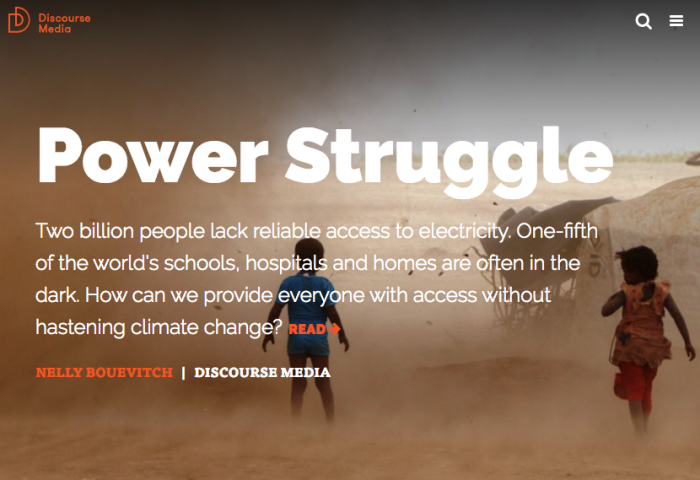
Discourse Media does a bit of everything.
The two-and-a-half year old Vancouver-based organization, for instance, collaborates with other media outlets on stories: It teamed up with Maclean’s reporter Nancy Macdonald on a months-long investigation into why Indigenous people are overrepresented in incarceration rates. That included conducting an original survey of post-secondary students after eight FOI requests with police agencies came up empty.
Discourse also administered a philanthropy-backed global fellowship, selecting nine journalists from around the world to report on energy access in their regions. It conducts the annual Canadian University Report for The Globe and Mail. On Friday, it launched Toward Reconciliation, a multi-part project about how journalism can drive better public discourse around Canadian colonial history, Indigenous land rights, and reconciliation (the investigation with Maclean’s on disproportionate incarceration rates for Indigenous people was one element of this project). At one point early on, it even worked on a sponsored content project.
“We’ve had to pivot quickly, and it’s been stressful at times,” Erin Millar, Discourse Media’s cofounder and CEO, said. “We’ve gone down lots of experimental rabbit holes.”

Millar and journalists Christine McLaren and Colleen Kimmett started Discourse in 2014. Each of them had struggled to find homes for their story ideas (Millar’s beat was education, McLaren’s was urban development; and Kimmett’s was food systems).
“After ten years reporting on these issues, I got to a point where I really understood the systemic challenges. But I had a difficult time landing them somewhere. It was always, this one story about a single labor dispute, this one fight over funding. I felt like a broken record,” Millar said. “I wanted to be doing more ambitious stories that might help improve these systems.”Discourse relies on philanthropic and nonprofit partners and collaborating media outlets to fund much of its work. It also generates some revenue through workshops, speaking engagements, and other events. Due to Canadian tax laws, Discourse has had to strive for profitability from the beginning, though its mission of collaboration, investigative data-driven reporting, and calls for journalistic independence are more akin to U.S. nonprofit ventures like ProPublica.
“We didn’t start with an investor or big foundation coming in and saying they’d fund this for a couple years,” Millar said. “That’s been good and bad for us. It’s meant that we’ve had to figure out revenue models extremely quickly. We’ve got five different revenue models we’re working on. All the nonprofits have pressure on them to develop more diverse revenue models, but we were ahead on that out of necessity.”
The cofounders bootstrapped the company, for the most part, with loans from themselves and their families. Discourse has now “hit sustainability,” after running at a slight loss for the first two years, and this year’s revenue is triple last year’s, Millar said. The company started out with the concept of being “a collaborative of freelancers,” and producing projects for media clients still makes up about 25 percent of its overall revenue, but philanthropic and nonprofit partner funding now make up more than 50 percent.
The company is “looking to make a pretty ambitious move” in the next 12 to 18 months, Millar said, which will require a proper round of investments. She wasn’t ready to share details, but hinted an audio product and a digital publication are in the works for the coming year.At its core, Discourse is focused on better collaboration. With about eight full-time staffers and a regular group of freelancers brought on as needed, the team is used to hustling, and is diligent about seeking out the expertise of academics and researchers.
“We go through a development phase for projects to figure out where the holes are in the media landscape, do a literature review, and as part of that we identify people in the field who are doing really great work that maybe isn’t being communicated to a general audience,” Caitlin Havlak said. Havlak is manager of research partnerships and digital, and her role is multi-faceted: she is a liaison between the research community and journalists, oversees digital platforms, and does all the work a data journalist would, analyzing data and designing visualizations.

For its crowdfunded the Moving Forward project, a collection of stories, data sets, and interactives based on the data on the future of the transportation system in metro Vancouver, the company worked with the Centre for Public Dialogue at Simon Fraser University and academics at University of British Columbia, as well as community platform PlaceSpeak. Discourse also makes the work available under a Creative Commons license so it can be widely shared.
“We’re pretty new as an organization, but the people we’ve worked with so far have been excited about collaborating with us because they’re interested in getting their work out there,” Havlak said. “People in the research community are interested in communicating their work, but they have to do that separately from their day job, and they don’t always have time to do it well. But they can do it with us.”
What hasn’t Discourse done? Writer Ian Gill, who’s finishing a book about the state of Canadian media and is now serving as a strategic advisor to the Discourse team, was effusive in his praise: Throughout the course of researching for the book, he told me, “it became very clear that Discourse is one of the few Canadian digital products that is really taking on the full complexity of what it takes to be a full-service journalism organization. It’s not quite there yet, but I think it’s a bright light in a dim landscape.”
Millar, though, spoke modestly and practically about the many hats the company wears.
“We do everything we can to catalyze dialogue,” Millar said. “Not all of our work is publishing an article. Some of it isn’t visible. It’s bugging the Ministry of Justice to follow up, it’s tracking impact, it’s holding events. We stick with our projects.”